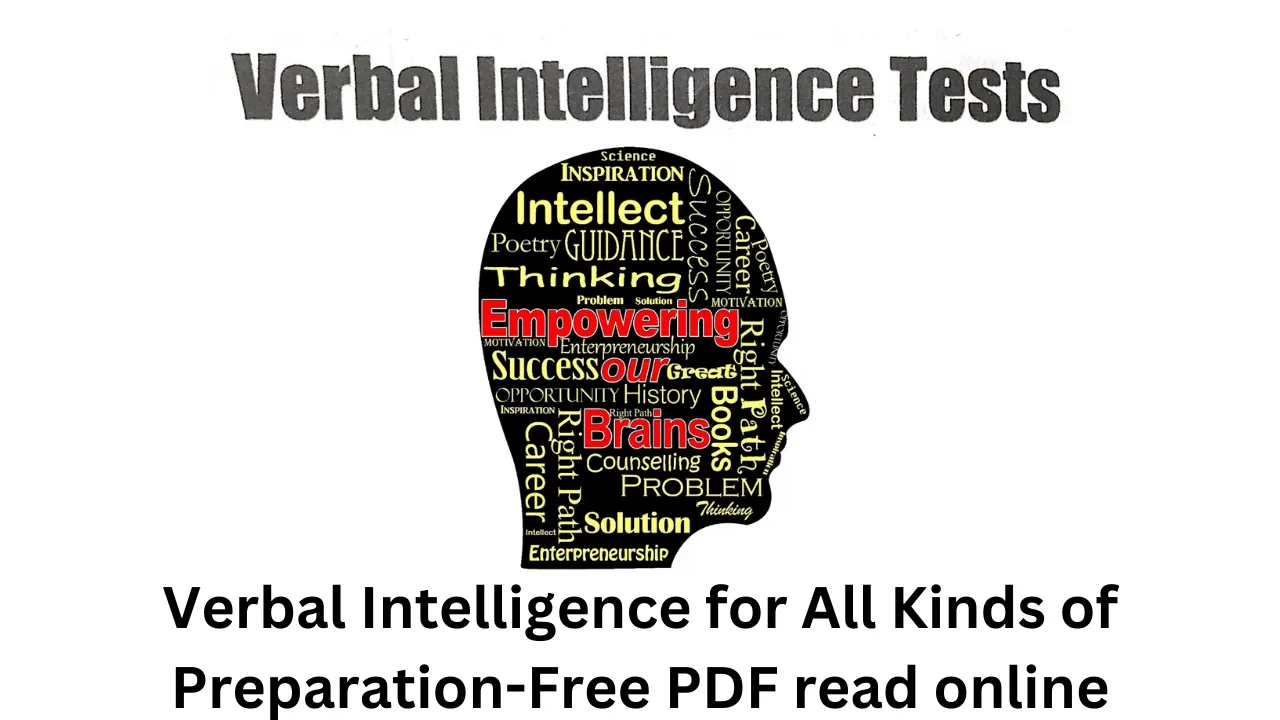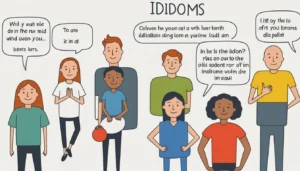Verbal Intelligence for All Kinds of Preparation-Free PDF read online
Verbal Intelligence: Unlocking the Power of Words for Personal and Professional Success

In today’s fast-paced, communication-driven world, the ability to effectively express oneself and comprehend complex ideas through language has never been more crucial. This capacity, known as verbal intelligence, plays a pivotal role in our personal and professional lives. Whether you’re a student aiming for academic excellence, a professional climbing the corporate ladder, or simply someone looking to enhance their cognitive abilities, understanding and improving your verbal intelligence can be a game-changer.
In this comprehensive guide, we’ll delve deep into the world of verbal intelligence, exploring its definition, components, and far-reaching impacts. We’ll also provide you with practical strategies to boost your verbal skills and navigate the challenges of an increasingly verbal world. By the end of this article, you’ll have a clear understanding of how to harness the power of words to achieve greater success in all areas of your life.
What is verbal intelligence?
Verbal intelligence, also known as linguistic intelligence, refers to the ability to understand, use, and manipulate language effectively. It encompasses a wide range of skills related to words and language, both in spoken and written forms. Let’s break down the key components of verbal intelligence:
- Vocabulary: A rich and diverse vocabulary forms the foundation of verbal intelligence. It’s not just about knowing many words, but understanding their nuances and using them appropriately in various contexts.
- Reading Comprehension: This involves the ability to understand, interpret, and analyze written text. It goes beyond mere
- decoding of words to grasping the deeper meaning and implications of what’s written.
- Verbal Reasoning: This component deals with the capacity to think logically about language, draw inferences, and solve problems presented in verbal form.
- Verbal Memory: The ability to remember and recall verbal information, such as names, facts, and concepts, is crucial for verbal intelligence.
- Language Processing: This involves the speed and efficiency with which one can process linguistic information, both in comprehension and production.
It’s important to note that verbal intelligence is just one facet of overall cognitive ability. While it’s closely related to other forms of intelligence, such as logical-mathematical and interpersonal intelligence, it represents a distinct set of skills that can be independently developed and improved.
The Science Behind Verbal Intelligence
Understanding the scientific basis of verbal intelligence can provide valuable insights into how we can enhance these skills. Here’s a brief overview of the neurological and developmental aspects:
Neurological Basis
Verbal intelligence is primarily associated with the left hemisphere of the brain, particularly the Broca’s and Wernicke’s areas. These regions are responsible for language production and comprehension, respectively. However, recent research suggests that language processing involves a more distributed network across both hemispheres.
Developmental Stages
Verbal intelligence begins developing in infancy and continues to evolve throughout life. Key stages include:
- Early Childhood: Rapid vocabulary acquisition and basic grammar understanding
- School Years: Refinement of reading and writing skills, expansion of vocabulary
- Adolescence: Development of abstract thinking and complex language use
- Adulthood: Continued growth through lifelong learning and experience
Genetic vs. Environmental Factors
Like many cognitive abilities, verbal intelligence is influenced by both genetic and environmental factors. While some individuals may have a genetic predisposition for strong verbal skills, the environment plays a crucial role in their development. Factors such as early childhood education, exposure to rich language environments, and ongoing learning opportunities significantly impact verbal intelligence.
Measuring Verbal Intelligence
Assessing verbal intelligence can provide valuable insights into an individual’s strengths and areas for improvement. Here are some common methods:
Standardized Tests
- Verbal IQ Tests: Part of comprehensive IQ assessments, these measure various aspects of verbal ability.
- SAT/ACT Verbal Sections: These college admission tests include sections that evaluate reading comprehension and vocabulary.
- GRE Verbal Reasoning: This graduate school admission test assesses advanced verbal reasoning skills.
Informal Assessments
- Vocabulary quizzes
- Reading comprehension exercises
- Verbal analogy tests
It’s important to note that while these tests can provide useful information, they have limitations. They may not capture the full range of an individual’s verbal abilities and can be influenced by factors such as test-taking anxiety or cultural biases.
Also Check Tehsildar Screening Test Guide:تحصیلدار free pdf read online
The Impact of Verbal Intelligence on Success
The influence of strong verbal skills extends far beyond academic or professional settings. Here’s how verbal intelligence can contribute to various aspects of success:
Academic Performance
Students with high verbal intelligence often excel in subjects that require strong reading and writing skills, such as literature, history, and social sciences. They tend to have an easier time understanding complex texts and expressing their ideas clearly in essays and reports.
Career Advancement
In the professional world, verbal intelligence is a valuable asset. It can lead to:
- More effective communication with colleagues and clients
- Improved presentation and public speaking skills
- Better writing abilities for reports, proposals, and emails
- Enhanced ability to understand and explain complex concepts
Social Relationships
Strong verbal skills can significantly improve interpersonal relationships by:
- Facilitating clear and empathetic communication
- Enhancing ability to express emotions and understand others
- Improving conflict resolution skills through effective dialogue
Leadership Skills
Leaders with high verbal intelligence can:
- Articulate visions and goals more effectively
- Inspire and motivate teams through powerful speeches and conversations
- Negotiate and persuade with greater success
Problem-Solving Abilities
Verbal intelligence contributes to problem-solving by:
- Enhancing ability to understand and define problems clearly
- Improving communication of solutions and ideas
- Facilitating collaborative problem-solving through effective dialogue
10 Strategies to Improve Verbal Intelligence
Enhancing your verbal intelligence is a lifelong journey. Here are ten effective strategies to boost your linguistic abilities:
- Expand Your Vocabulary
- Read widely across various genres and topics
- Use a word-a-day app or calendar
- Keep a personal vocabulary journal
- Use new words in conversation and writing
- Read Extensively and Diversely
- Set reading goals (e.g., one book per month)
- Explore different genres and writing styles
- Discuss what you read with others
- Practice critical reading by analyzing and questioning the text
- Practice Active Listening
- Focus intently on the speaker
- Ask clarifying questions
- Paraphrase to ensure understanding
- Reflect on the content of conversations
- Engage in Word Games and Puzzles
- Solve crossword puzzles regularly
- Play word games like Scrabble or Boggle
- Enjoy word search puzzles
- Try online word-game apps
- Write Regularly
- Keep a journal or blog
- Practice writing in different styles (e.g., persuasive, descriptive)
- Participate in writing workshops or groups
- Seek feedback on your writing
- Learn a New Language
- Study a foreign language through apps, classes, or immersion
- Practice regularly with native speakers
- Watch movies or TV shows in the target language
- Read books in the new language
- Participate in Debates and Discussions
- Join a debate club or discussion group
- Engage in thoughtful discussions on various topics
- Practice articulating your views clearly and persuasively
- Listen to and consider opposing viewpoints
- Use Mnemonic Devices
- Create acronyms or acrostics to remember information
- Use rhymes or songs to memorize facts
- Employ the method of loci (memory palace technique)
- Practice visualization techniques
- Study Etymology
- Learn the origins and histories of words
- Understand root words, prefixes, and suffixes
- Explore how languages have evolved over time
- Use etymology to decipher unfamiliar words
- Teach Others
- Explain concepts to friends or family
- Tutor students in language-related subjects
- Create educational content (e.g., blog posts, videos)
- Participate in language exchange programs
Verbal Intelligence in the Digital Age
The digital revolution has significantly impacted how we use and develop verbal intelligence. Here are some key considerations:
Impact of Technology on Verbal Skills
- Positive Effects:
- Access to vast online libraries and educational resources
- Opportunities for global communication and language exchange
- Tools for instant word definitions and translations
- Challenges:
- Shortened attention spans due to quick-scroll culture
- Overreliance on autocorrect and predictive text
- Reduced face-to-face communication opportunities
Adapting Verbal Intelligence for Online Communication
- Developing clear and concise writing for emails and instant messaging
- Understanding and using appropriate online communication etiquette
- Interpreting tone and context in text-based conversations
- Effectively using emojis and other digital cues to enhance meaning
Balancing Digital and Traditional Verbal Skills
- Practicing both digital writing and handwriting
- Engaging in both online and in-person discussions
- Reading both digital and print materials
- Developing skills for both written and spoken communication
Verbal Intelligence Across Cultures
In our increasingly globalized world, understanding the cultural aspects of verbal intelligence is crucial.
Cultural Variations in Verbal Expression
- Different cultures may value certain aspects of verbal intelligence differently
- Nonverbal cues and context play varying roles across cultures
- Idiomatic expressions and humor can be highly culture-specific
Bilingualism and Verbal Intelligence
- Learning multiple languages can enhance overall verbal intelligence
- Bilingual individuals often demonstrate improved cognitive flexibility
- Code-switching between languages can boost creative thinking
Navigating Verbal Intelligence in a Globalized World
- Developing cultural sensitivity in communication
- Adapting communication styles for international audiences
- Understanding and respecting diverse communication norms
Challenges and Misconceptions About Verbal Intelligence
While verbal intelligence is undoubtedly valuable, it’s important to address some common challenges and misconceptions:
Overemphasis on Verbal Skills
- Some educational systems may overvalue verbal skills at the expense of other intelligences
- This can lead to underestimation of individuals with strengths in other areas (e.g., visual-spatial or kinesthetic intelligence)
Verbal Intelligence vs. Emotional Intelligence
- High verbal intelligence doesn’t necessarily correlate with strong emotional intelligence
- Balancing verbal skills with emotional awareness is crucial for effective communication
Addressing Verbal Intelligence Disparities in Education
- Socioeconomic factors can significantly impact verbal intelligence development
- Educational systems need to address these disparities to ensure equal opportunities
Practical Applications of Verbal Intelligence
Strong verbal intelligence can be applied in numerous real-world situations.
Public Speaking
- Crafting compelling speeches and presentations
- Adapting language for different audiences
- Using rhetorical devices effectively
Writing and Content Creation
- Producing clear, engaging written content
- Tailoring writing style for different mediums (e.g., blogs, academic papers, marketing copy)
- Storytelling and narrative development
Negotiation and Persuasion
- Articulating arguments clearly and persuasively
- Active listening to understand others’ positions
- Using language to build rapport and trust
Customer Service and Sales
- Effective problem-solving through clear communication
- Adapting language to meet customer needs
- Persuasive product descriptions and pitches
Teaching and Mentoring
- Explaining complex concepts in understandable terms
- Providing clear instructions and feedback
- Inspiring and motivating learners through language
The Future of Verbal Intelligence
As we look ahead, several trends are shaping the future of verbal intelligence:
Emerging Research and Trends
- Neuroscience advancements provide deeper insights into language processing
- Increased focus on the relationship between verbal skills and overall cognitive health
- Growing recognition of the importance of multilingual abilities
AI and Natural Language Processing
- AI-powered language learning tools becoming more sophisticated
- Potential challenges in distinguishing human vs. AI-generated content
- There is an increased need for humans to develop unique verbal skills that AI cannot replicate
Evolving Importance in the Job Market
- There is a rising demand for strong communication skills across all sectors
- Growing emphasis on “soft skills,” including verbal abilities
- Increasing value placed on multilingual professionals in global markets
Conclusion
Verbal intelligence is a powerful tool that can open doors to personal growth, academic success, and professional advancement. By understanding its components and actively working to enhance your linguistic abilities, you can unlock new levels of communication effectiveness and cognitive prowess.
Remember, improving your verbal intelligence is a lifelong journey. Start by assessing your current skills, setting realistic goals, and consistently applying the strategies we’ve discussed. Whether it’s expanding your vocabulary, engaging in thoughtful discussions, or exploring new languages, every step you take enhances your ability to understand, express, and influence through the power of words.
We encourage you to reflect on your own verbal intelligence journey. What areas do you feel strongest in? Where do you see room for improvement? Consider taking an online verbal ability test to get a baseline, and then challenge yourself to improve over time.
Embrace the power of words and watch as new opportunities unfold in both your personal and professional lives. The world is waiting to hear what you have to say; make it count!
Read Online Complete Tests Verbal Intelligence for All Kinds of Preparation













Post Comment